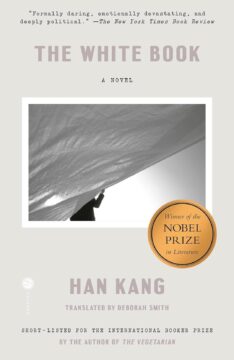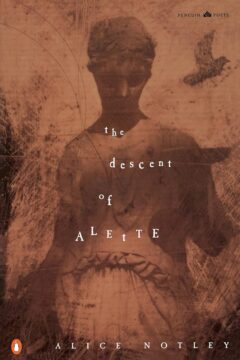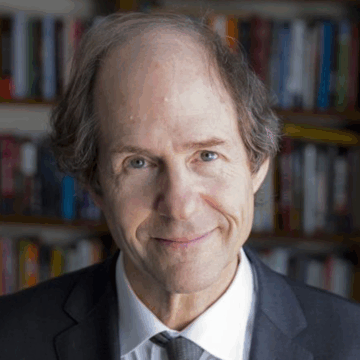Via Dolorosa
The sun has barely roused itself when I hear screams
over the coffee pot, but a glance out the window
thaws my dread. Just three teens raging
at the warm horizon. I know that cry—the one
my sisters and I hurled at the field in fledgling
heartbreak, our young throats yelled raw.
Yes, these girls threading through cotton
are mourning boys whose names they’ll forget
in a few harvests. Do they know to watch out
for mice and snakes? No—they imagine
out here’s a life without danger.
They imagine they race to mystery.
But it’s all science, really, learning how
the earth yields and heals itself. We step in
where we can with sweat, lost sleep, bruised thumbs.
But I’ll let them think it’s magic, that thorns
in their sweaters could somehow mend sorrow.
Sometimes I let myself believe the same.
by Whitney Rio-Ross
from Ec0 Theo Review
Enjoying the content on 3QD? Help keep us going by donating now.

 SOUTH KOREAN WRITER Han Kang is perhaps best known for her 2007 novel The Vegetarian, a violent, evocative work that led to her 2024 Nobel Prize win. But hiding in plain sight has been her 2016 masterpiece The White Book, whose English translation by Deborah Smith was recently reissued in paperback by Hogarth. An experimental, autobiographical novel, The White Book contains profound insights about the nature of grief and color that—like so many overlooked novels—are devilishly difficult to describe. But by digging into the novel’s poetic logic with an ear tuned to sound and silence, we can begin to tease it out.
SOUTH KOREAN WRITER Han Kang is perhaps best known for her 2007 novel The Vegetarian, a violent, evocative work that led to her 2024 Nobel Prize win. But hiding in plain sight has been her 2016 masterpiece The White Book, whose English translation by Deborah Smith was recently reissued in paperback by Hogarth. An experimental, autobiographical novel, The White Book contains profound insights about the nature of grief and color that—like so many overlooked novels—are devilishly difficult to describe. But by digging into the novel’s poetic logic with an ear tuned to sound and silence, we can begin to tease it out. Seventy-five years after the outbreak
Seventy-five years after the outbreak My desire to live in a city was not simply one of seeking like-minded people (other writers and artists, perhaps) and creating a smaller environmental footprint. I was also running from the lifeless suburbs of my childhood and what lay just beyond them: the dreaded sprawl.
My desire to live in a city was not simply one of seeking like-minded people (other writers and artists, perhaps) and creating a smaller environmental footprint. I was also running from the lifeless suburbs of my childhood and what lay just beyond them: the dreaded sprawl. The latest ambition of artificial intelligence research — particularly within the labs seeking “artificial general intelligence,” or AGI — is something called a world model: a representation of the environment that an AI carries around inside itself like a computational snow globe. The AI system can use this simplified representation to evaluate predictions and decisions before applying them to its real-world tasks. The deep learning luminaries Yann LeCun (of Meta), Demis Hassabis (of Google DeepMind) and Yoshua Bengio (of Mila, the Quebec Artificial Intelligence Institute) all believe world models are essential for building AI systems that are truly
The latest ambition of artificial intelligence research — particularly within the labs seeking “artificial general intelligence,” or AGI — is something called a world model: a representation of the environment that an AI carries around inside itself like a computational snow globe. The AI system can use this simplified representation to evaluate predictions and decisions before applying them to its real-world tasks. The deep learning luminaries Yann LeCun (of Meta), Demis Hassabis (of Google DeepMind) and Yoshua Bengio (of Mila, the Quebec Artificial Intelligence Institute) all believe world models are essential for building AI systems that are truly  We have each had the honor and privilege of serving as director of the Centers for Disease Control and Prevention, either in a permanent or an acting capacity, dating back to 1977. Collectively, we spent more than 100 years working at the C.D.C., the world’s pre-eminent public health agency. We served under multiple Republican and Democratic administrations — every president from Jimmy Carter to Donald Trump — alongside thousands of dedicated staff members who shared our commitment to saving lives and improving health.
We have each had the honor and privilege of serving as director of the Centers for Disease Control and Prevention, either in a permanent or an acting capacity, dating back to 1977. Collectively, we spent more than 100 years working at the C.D.C., the world’s pre-eminent public health agency. We served under multiple Republican and Democratic administrations — every president from Jimmy Carter to Donald Trump — alongside thousands of dedicated staff members who shared our commitment to saving lives and improving health. Robert F. Kennedy Jr., the secretary of health and human services, is endangering the health of the American people now and into the future. He must resign. Mr. Kennedy and the rest of the Trump administration tell us, over and over, that they want to Make America Healthy Again. That’s a great slogan. I agree with it. The problem is that since coming into office President Trump and Mr. Kennedy have done exactly the opposite.
Robert F. Kennedy Jr., the secretary of health and human services, is endangering the health of the American people now and into the future. He must resign. Mr. Kennedy and the rest of the Trump administration tell us, over and over, that they want to Make America Healthy Again. That’s a great slogan. I agree with it. The problem is that since coming into office President Trump and Mr. Kennedy have done exactly the opposite. A common type of ant in Europe breaks a fundamental rule in biology: its queens can produce male offspring that are a whole different species. These queen Iberian harvester ants (Messor ibericus) are sexual parasites that rely on the sperm of males of the ant species Messor structor. They use this sperm to breed an army of robust worker ants, which are hybrids of the two species. Data now show that, in the absence of nearby M. structor colonies, M. ibericus queens can clone male M. structor ants by laying eggs that contain only M. structor DNA in their nuclei. The findings were published in Nature on 3 September
A common type of ant in Europe breaks a fundamental rule in biology: its queens can produce male offspring that are a whole different species. These queen Iberian harvester ants (Messor ibericus) are sexual parasites that rely on the sperm of males of the ant species Messor structor. They use this sperm to breed an army of robust worker ants, which are hybrids of the two species. Data now show that, in the absence of nearby M. structor colonies, M. ibericus queens can clone male M. structor ants by laying eggs that contain only M. structor DNA in their nuclei. The findings were published in Nature on 3 September A few days before she died, I asked Alice if she would make me a list of her favorite folk songs, the ones she’d sometimes sing while we worked together in her apartment. She emailed me from her hospital bed with the subject line “probably illegible” and a photo showing her open notebook with two pages of handwritten song titles. “Careless Love,” “Wild Mountain Thyme,” “What is the Soul of a Man,” “Shady Grove.” At the bottom of the image, she arranged two figurines—a blue-eyed owl and little R2-D2—to weigh down the pages. “Baby, Please Don’t Go,” “Down in the Valley,” “Spanish Johnny,” “In the Pines.” There are no musicians, just song titles—these are folk and blues songs, after all—all written in her lush cursive. “Shenandoah,” “Black Is the Color of My True Love’s Hair,” “The Water Is Wide,” “See That My Grave Is Kept Clean.” This will be the last thing she says to me.
A few days before she died, I asked Alice if she would make me a list of her favorite folk songs, the ones she’d sometimes sing while we worked together in her apartment. She emailed me from her hospital bed with the subject line “probably illegible” and a photo showing her open notebook with two pages of handwritten song titles. “Careless Love,” “Wild Mountain Thyme,” “What is the Soul of a Man,” “Shady Grove.” At the bottom of the image, she arranged two figurines—a blue-eyed owl and little R2-D2—to weigh down the pages. “Baby, Please Don’t Go,” “Down in the Valley,” “Spanish Johnny,” “In the Pines.” There are no musicians, just song titles—these are folk and blues songs, after all—all written in her lush cursive. “Shenandoah,” “Black Is the Color of My True Love’s Hair,” “The Water Is Wide,” “See That My Grave Is Kept Clean.” This will be the last thing she says to me. Zhuangzi’s view, as interpreted by Guo, is that when we seek a definite identity, we betray our true nature as fundamentally fluid and indeterminate. We end up pursuing some external model of definiteness. Even if the model is one of our own devising, it is external to our true indefinite nature. One story in the Zhuangzi tells of a welcoming and benevolent but faceless emperor, Hundun. Hundun has a face drilled into him by two other emperors who already have faces of their own. As a result, he dies. The story suggests that fixed identity always comes to us from the outside, from others who have already attached themselves to fixed identities and drive us to do the same, not usually by drills but rather by example. This peer-driven attachment to identity kills our fundamental nature, which is formless and fluid like Hundun (his name, 混沌, means something like ‘mixed-up chaos’, and each character contains the water radical signalling fluidity). Our true Hundun-nature is the capacity to take on many forms without being finally defined by any of them.
Zhuangzi’s view, as interpreted by Guo, is that when we seek a definite identity, we betray our true nature as fundamentally fluid and indeterminate. We end up pursuing some external model of definiteness. Even if the model is one of our own devising, it is external to our true indefinite nature. One story in the Zhuangzi tells of a welcoming and benevolent but faceless emperor, Hundun. Hundun has a face drilled into him by two other emperors who already have faces of their own. As a result, he dies. The story suggests that fixed identity always comes to us from the outside, from others who have already attached themselves to fixed identities and drive us to do the same, not usually by drills but rather by example. This peer-driven attachment to identity kills our fundamental nature, which is formless and fluid like Hundun (his name, 混沌, means something like ‘mixed-up chaos’, and each character contains the water radical signalling fluidity). Our true Hundun-nature is the capacity to take on many forms without being finally defined by any of them. “Liberalism,” divorced from its particular connotations in this or that modern political context, refers broadly to a philosophy of individual rights, liberties, and responsibilities, coupled with respect for institutions and rule of law over personalized power. As Cass Sunstein construes the term, liberalism encompasses a broad tent, from Ronald Reagan and Margaret Thatcher to Martin Luther King and Franklin Roosevelt. But liberalism is being challenged both from the right and from the left, by those who think that individual liberties can go too far. We talk about the philosophical case for liberalism as well as the challenges to it in modern politics, as discussed in his new book
“Liberalism,” divorced from its particular connotations in this or that modern political context, refers broadly to a philosophy of individual rights, liberties, and responsibilities, coupled with respect for institutions and rule of law over personalized power. As Cass Sunstein construes the term, liberalism encompasses a broad tent, from Ronald Reagan and Margaret Thatcher to Martin Luther King and Franklin Roosevelt. But liberalism is being challenged both from the right and from the left, by those who think that individual liberties can go too far. We talk about the philosophical case for liberalism as well as the challenges to it in modern politics, as discussed in his new book  Fourteen years ago, Noam Chomsky
Fourteen years ago, Noam Chomsky  Fragile quantum states might seem incompatible with the messy world of biology. But researchers have now coaxed cells to produce quantum sensors made of proteins. Quantum states are incredibly sensitive to changes in the environment. This is a double-edged sword. On the one hand, they can
Fragile quantum states might seem incompatible with the messy world of biology. But researchers have now coaxed cells to produce quantum sensors made of proteins. Quantum states are incredibly sensitive to changes in the environment. This is a double-edged sword. On the one hand, they can